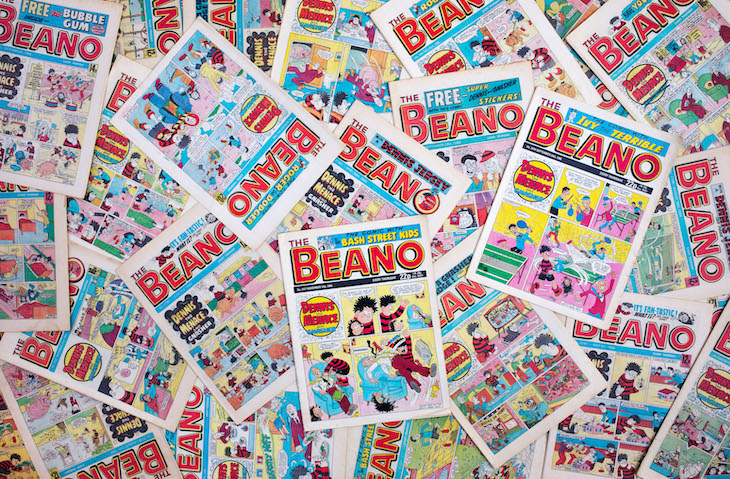One of the regular characters in Viz is an old woman called Meddlesome Ratbag who goes to great lengths to engineer situations in which she can be offended so she can complain to the authorities. I was reminded of her this morning when I read the British Medical Journal‘s investigation into the Beano. Yes, you did read that correctly. One of the world’s leading medical journals has been devoting its attention to a children’s comic.
It turns out the Beano has a popular website that has been visited by nearly 48 million kids since its launch in 2016, according to the investigators. It stands accused of mentioning the brand names of various sweets, treats and fast food companies. These products are not advertised on the website and no money has changed hands. The owners of the comic have clarified that on occasions when they work with companies, this is ‘always clearly marked’ on their website and ‘would never include’ brands deemed by the government to be ‘high in fat, sugar or salt’ (HFSS).
Our intrepid researchers complain about the Beano having an ‘Ultimate McDonald’s Quiz’
The Beano is nevertheless accused on ‘exposing children to HFSS content’ by acknowledging the existence of the likes of Skittles and Greggs. In an overwrought editorial accompanying the investigation, the BMJ says:
‘Today’s “innocent fun” is tomorrow’s health crisis.’
People used to laugh at Mary Whitehouse, but the kind of pearl-clutching regularly seen in supposedly serious academic journals these days goes beyond anything she was capable of. The BMJ investigation, such as it is, is a thin piece of work padded out with quotes from outraged nanny statists like Henry Dimbleby.
Until today I was unaware of beano.com – yet the website is absolutely enormous. It contains over a thousand quizzes, hundreds of games and countless jokes. I doubt any of them are funnier that the idea of earnest public health researchers spending days going through them one by one, looking for something to be offended by.
The fruits of their labour are as follows:
‘There are 125 separate quizzes or fact files that mention chocolate, 143 that feature cakes, and even one that features alcohol, asking, “How long have humans been making beer for?”—accompanied by an image of a pint being poured. It has 10 food games, eight of which revolve around chocolate, cakes, sweets, doughnuts, or fried chicken.’
Shocking stuff, I’m sure you’ll agree. Alas, it gets worse.
‘Of more concern, in the eyes of some campaigners, are the frequent references to well known HFSS brands.’
On a website so dense with content, it is debatable how ‘frequent’ these references are. The investigators complain there is a ‘Skittles jokes’ page, but do not mention that there are also pages for lettuce jokes, strawberry jokes, lemon jokes, salmon jokes, coconut jokes, grape jokes, cereal jokes, sushi jokes, plum jokes and too many other food-based joke compilations to mention. Not very surprisingly, the Beano website contains a lot of jokes.
Our intrepid researchers also complain about the Beano having an ‘Ultimate McDonald’s Quiz’ and an ‘Ultimate Food Logo’ quiz, the latter of which includes a number of fast food companies. If this all there was on the website, it might seem odd and possibly a bit suspicious, but it has a quiz for everything: Sheffield United, Adele songs, St Patrick’s Day, EastEnders, Peter Rabbit, Jude Bellingham, Nintendo Console, Bitcoin, Bollywood, Irish rugby, famous businesswomen, fruit and veg, ancient Egypt, Glastonbury and many hundreds of other topics, some of which I have never heard of. Name an aspect of popular culture and the Beano probably has a quiz about it.
Fast food brands are mentioned occasionally because, whether the BMJ likes it or not, they are part of popular culture. The mentions are not ‘frequent’. The Beano does not shove them in the reader’s face. Like Meddlesome Ratbag, you really have to go out of your way to find them.
The investigators acknowledge that the Beano has not broken any laws and that what it is doing will not be illegal even after the government’s draconian new food advertising ban is introduced. Britain may be a puritanical nanny state, but there are not yet any plans to make it a crime to write about cakes and chocolate or to mention Pizza Hut by name.
The ban on so-called ‘junk food’ advertising is due to be introduced in 2025 and the BMJ article gives us an idea of what to expect from the so-called ‘public health’ lobby after it comes into effect. They will be no dialling down of the hysteria and censoriousness. On the contrary, the wailing will get louder. The demands will get more extreme. People who get angry about images of cupcakes on a comic book’s website cannot be reasoned with. They are never going to stop.






Comments